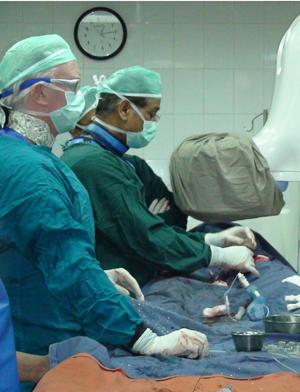 |
Drs . Edward O’Leary, left, and Abidur Rahman perform a cardiac procedure on a patient during their recent Physicians for Peace mission. |
That’s why Edward O’Leary, M.D., associate professor of cardiology at UNMC and a cardiologist at The Nebraska Medical Center, has made three trips there in the last five years with Physicians for Peace. The mission was led by Bangladesh native Dr. Abidur Rahman.
Drs. O’Leary and Rahman were joined by Veterans’ Administration Medical Center nurse Monica Murzcek in donating their clinical and educational skills to patients and local physicians there.
“Our efforts were to provide some type of medical care for a relatively small number of people,” Dr. O’Leary said. “This is a densely populated country. Imagine half the population of the U.S. packed in an area the size of Iowa.
“The standard of living is very low; there is no national health care system, there is no health insurance.”
There are hospitals, Dr. O’Leary said. In recent years, private hospitals have been built to cater to the country’s small upper class population which in years past would have left the country for medical care.
Most of Dr. O’Leary’s time was spent at government-run hospitals like the National Institute of Cardiovascular Disease, the only cardiovascular specialty hospital in Bangladesh.
It admits more than 700 cardiac patients each week. When beds are not available, patients lie on the floor. But the lack of bed space was not the problem; it was access to equipment like stents and cardiac catheter wires.
“If a patient needs a stent put in, or they need a bypass, they have to come up with a lot of money for that,” Dr. O’Leary said. “People will sell their land, their cow, whatever they can sell. If they don’t have the money, they don’t get the care. The average income is $400 a year. That’s it. The stents are very expensive over there. If a patient needs a stent, the person who sells the stent comes in, asks if he has the money. If not, he’s off the table and goes back to the hospital bed.”
Dr. O’Leary knows the patient care given during these missions barely scratches the surface of the needs of a country with no organized health care system and a high rate of cardiovascular disease.
Dr. O’Leary said the ongoing benefit of the mission is the health education he can help provide to the local doctors.
“In one of the previous missions, I taught one of the doctors how to fix kidney arteries,” Dr. O’Leary said. “He’s been doing that ever since and has helped a lot of people.”
|
|
On this year’s trip, a short shopping trip on their last day was interrupted by fighting between rival military factions.
“Our shopping adventure was terminated when the shooting started,” Dr. O’Leary said. “The owner of the store where we were shopping closed the metal shutters and we waited there. We found out later there were 70 people killed, the tanks came in.”
Still, Dr. O’Leary never felt threatened by the people of Bangladesh. He described them as helpful and generous, and very appreciative of the medical care the physicians and nurses were there to provide.
“People were intrigued,” he said. “They wanted their pictures taken with white Americans. We were the only ones out of thousands and thousands.”
Dr. O’Leary is considering another mission. Making such a trip is a personal sacrifice, and a costly one. Each mission costs the traveling doctors several thousand dollars of their own money and impacts the amount of time they can spend doing their jobs at home.
But the scores of people who line up seeking his help during those trips have stayed with him when he returns to the United States.
“We were there for two and a half weeks,” Dr. O’Leary said. “The people of Bangladesh live under these difficult circumstances every day. You realize when you walk out of there, that’s it for them. And they know it too. Will I go back? I probably will.”